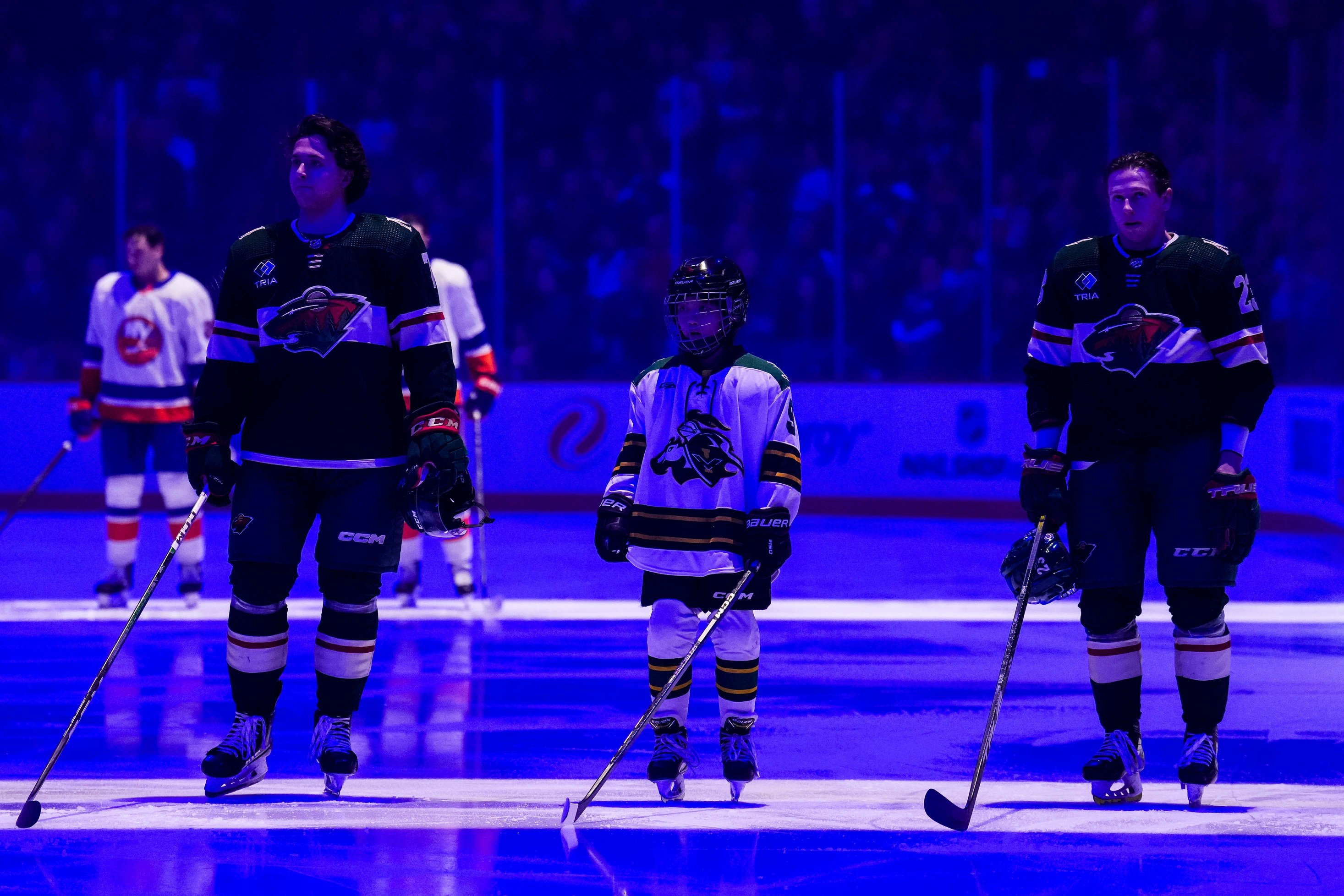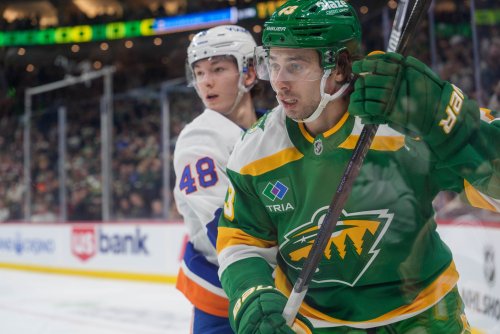
Brock Faber scored goals against the Carolina Hurricanes and New York Islanders on the Minnesota Wild’s most recent road trip, which is only notable because those are the first two goals Faber has scored this year. Well, at least while shooting the puck on net. His first goal of the year against the Winnipeg Jets on October 28 was a bit of a fluke.
There was a time when it wasn’t a novelty when Faber scored. The former Gopher from Maple Grove looked like one of the Hanson brothers’ sons and played like he fell from Al MacInnis’ family tree. The apple of Minnesota’s eye had eight goals and 47 points as a rookie in 2023-24, and ten goals and 29 points last year.
However, Faber was most productive before the 4 Nations Face-Off, a midseason exhibition tournament between the best players from Canada, Finland, Sweden, and the United States. Faber played heavy minutes in the tournament, leading Team USA with 28:50 of ice time in the final against Team Canada.
Faber’s production dropped after the tournament, likely due to fatigue. He only scored one goal and didn’t have an assist in March. Faber had three goals and two assists in April, but he started slow again this year. He didn’t have a point in his first nine games, and he scored his first goal on a bank shot.
That’s great if Faber made his money doing Dude Perfect videos. However, it’s a little more concerning when the Wild appear to have messed with his confidence by playing him 27:44 minutes per night on average while he was fatigued.
It’s also a problem when they have Faber on an eight-year, $68 million contract. Meanwhile, they have Marco Rossi, their rising star, on a three-year, $15 million bridge deal.
When the Wild had the Zach Parise-Ryan Suter cap penalties, they always prioritized making the playoffs – where they always lost in the first round – over player development. Bill Guerin has also prioritized larger, older players, likely because he was a 6-foot-2, 220-pound forward who was more productive in his 30s than in his 20s.
Case in point: The Wild didn’t have a development path for Marco Rossi. Instead, they allowed him to get lost in the woods.
Minnesota said Rossi was as NHL-ready a prospect as you’d find at ninth overall. They drafted the Austrian musclehamster in 2020, and COVID derailed his early career. Then, Minnesota sent him on the train to nowhere. Er, well, the Iowa cornfields.
In 2021-22, he had 53 points in 63 AHL games but only played in two NHL games. A year later, he broke camp with the team, but they sent him down after he had only one point in 19 games. That makes sense. However, they never recalled him after he had 51 points in 53 games with Iowa.
Most teams would sprinkle in a prospect like Rossi throughout the year. Let him get sporadic NHL playing time to adjust to the world’s best league. Then again, most teams would tank to build a contender instead of indefinitely swaddling themselves in the insidious warmth of hockey purgatory.
Not the Wild, though. They celebrate reaching the playoffs, only to crash and burn in a fiery inferno.
Minnesota’s playoff losses are inevitable. Eight of the past ten seasons have ended in a first-round exit. They’ve unapologetically embraced eternal damnation. As Bill Guerin will remind you, he inherited a team that couldn’t get to the second round. However, he’s done his part to extend the trend by prioritizing veterans who can win in the regular season but not in the playoffs over young talent.
Liam Öhgren appears stuck in neutral. Jesper Wallstedt has bounced back after the Wild misled him on where he’d be playing. They traded a haul for David Jiříček, who somehow looks worse than he did last year.
However, Faber looked like a success story from the start.
Guerin traded Kevin Fiala and his soft skill (aka, scoring) for Faber, who only had seven goals in 97 games at the University of Minnesota. However, he turned into an offensive defenseman upon reaching the NHL, only to lose his scoring touch after the 4 Nations Face-Off.
Faber likely was better at 80% than most of Minnesota’s defensemen are at full capacity. Still, the Wild should have done what was right by him, knowing it was unlikely they’d go on a playoff run with their dead-cap penalties.
More pertinently, Guerin claims to have a five-year plan, which we learned about five years into his tenure. However, it’s hard to see his vision here. Either sign Faber and Rossi to bridge deals to mitigate developmental risk, but with the understanding that contract extensions are more expensive after the cap raise. Or sign them both to long-term contracts under the less costly pre-cap raise contracts.
Don’t sign Faber long-term because he’s 6-foot-1, 200 lbs., and give Rossi a short-term extension because he’s 5-foot-9, 182 lbs. Stop channeling Ty Webb and evaluating players simply by height. Guerin should have planned to keep the best players around and prioritized player development above all else when they had no chance to win in the playoffs. Now, they have a roster that looks a lot like their dead-cap teams.
Think you could write a story like this? Hockey Wilderness wants you to develop your voice, find an audience, and we'll pay you to do it. Just fill out this form.
-
 2
2
-
 1
1







Recommended Comments
Join the conversation
You can post now and register later. If you have an account, sign in now to post with your account.
Note: Your post will require moderator approval before it will be visible.